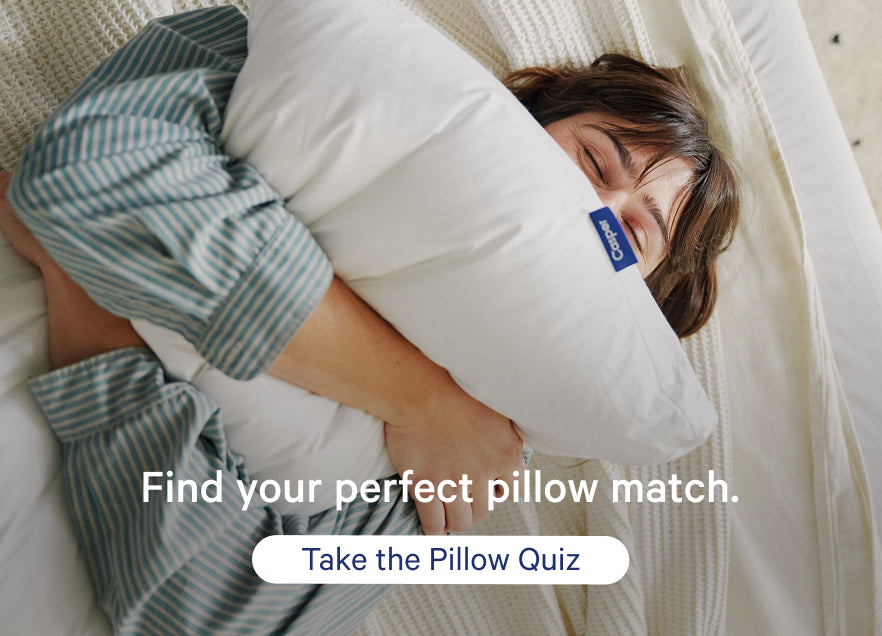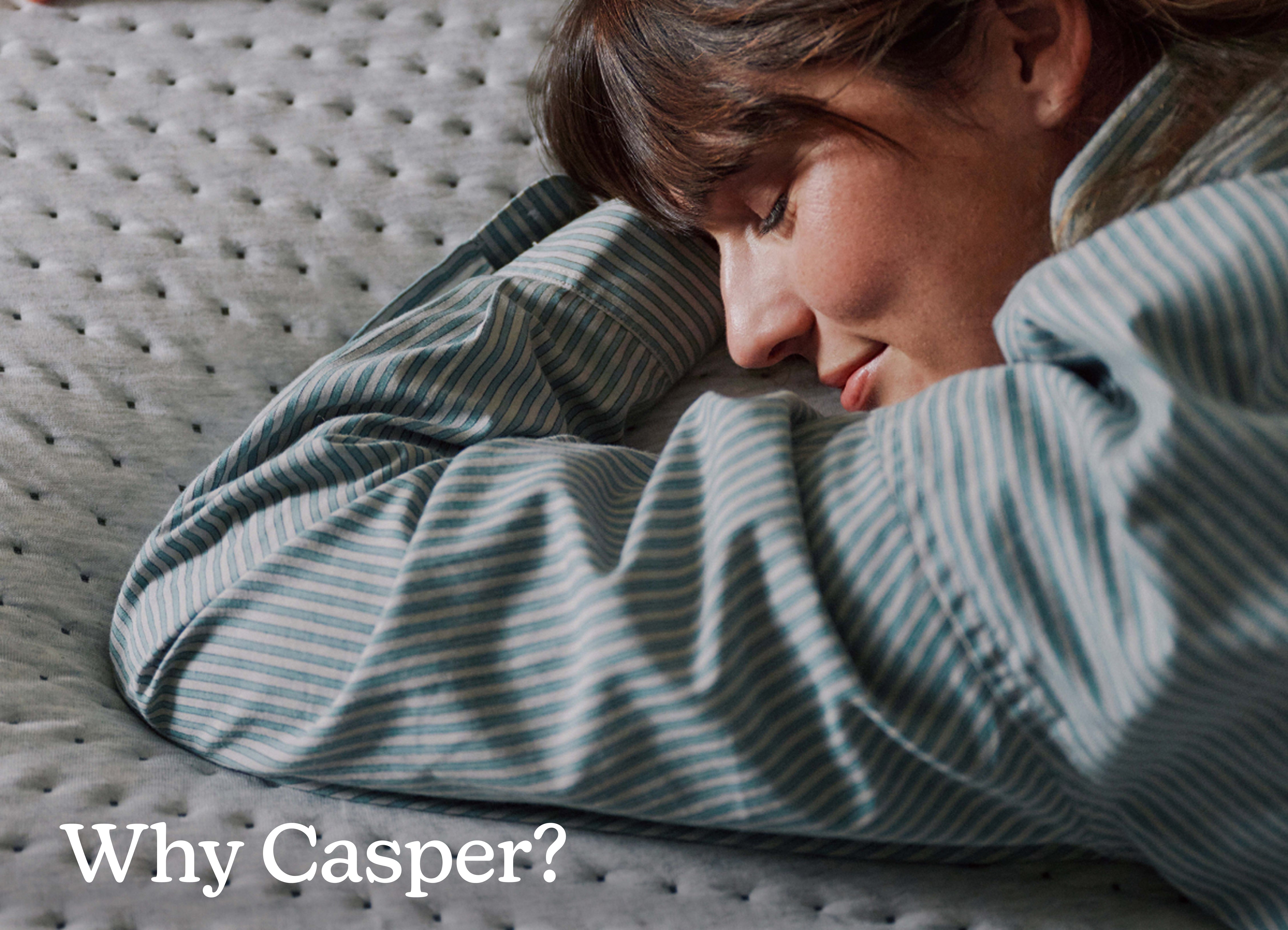For dog owners, it’s no longer acceptable to relegate your furry friend to the doghouse. In fact, 55 percent of pet owners surveyed said they share their bed with at least one dog. But is sleeping with your dog a good idea?
While there has been debate surrounding the subject for years, many studies find that sleeping with your pet can actually be good for you. A dog’s body warmth, steady heartbeat and protective nature can make co-sleeping with them feel safe and cozy.
If you’re worried that sharing your bed with your dog will impact your sleep quality, you can rest assured. Here we’ll cover 13 research backed reasons* why sleeping with your dog can be beneficial.
1. Reduces Depression

A recent study looked at how animal-assisted activities impacted depressive symptoms in humans. They found that people who performed activities or therapy with dogs reported fewer depressive symptoms.
If simply interacting with a dog can treat depression, imagine what sleeping next to one can do! Their presence helps us relax and increases our flow of oxytocin, the love chemical. This essentially makes your dog a living antidepressant!
2. Promotes Theta Brainwaves

Building on the fact that sleeping with dogs increases the flow of oxytocin, this also has a profound impact on how deeply we sleep. Sleeping with your dog, and the chemicals that accompany the experience, promote theta brainwaves, which are known to occur during the REM stage of sleep.
Studies have shown that when dogs are with their owners their heartbeats sync up. This is further evidence of the calming effects the presence of a dog can have on the human brain. So, next time you are sleeping near your dog, imagine your hearts beating in unison while you experience the deepest, most rejuvenating sleep.
3. Increases Sense of Security

Feeling safe can play a large part in how well you sleep. A recent study explored how the presence of a pet in bed impacted womens’ sleep quality and found that it made them feel more secure and comfortable.
Think about it — your dog’s instinct is to protect. They will let you know immediately if anything is amiss while you are asleep. While this can be problematic for overly-protective or sensitive dogs, many people find that knowing their dog is protecting them helps them sleep more soundly.
4. Eases Insomnia

There are few things worse than lying awake at night, not being able to sleep. Good news for those who suffer from anxiety-induced insomnia — a dog in the bed can help!
Studies suggest that having a dog in the bed can help relieve insomnia by mitigating anxiety and modifying hyperarousal and hypervigilance. All of this creates a better mood and environment for slumber, which can help combat insomnia.
5. Maximizes Comfort

That same collection of studies found that support animals can be used to diminish nightmares and even help those suffering from post-traumatic stress disorder (PTSD). The level of comfort a dog brings to the bed helps put you at ease and makes you feel cozy.
That furry, cuddly animal is likely to love lying with you just as much as you enjoy laying with them. This adds to that snuggly atmosphere that most dog owners find so comforting.
6. Decreases Loneliness

Especially for those living by themselves, sleeping alone can add to feelings of depression and discomfort. What better way to combat loneliness than with a living bed-warmer?
While some people prefer to sprawl out alone, recent studies suggest that many individuals — especially those who are single — find the presence of a pet helps them sleep. The companionship, security and relaxation your dog can provide is an excellent reason to co-sleep with them.
7. Improves Sleep Quality

Sleep efficiency is a score calculated to determine how much time you actually spend sleeping while you are in bed. One study recently found that humans who slept with a dog in their bedroom kept a better routine and were able to sleep more efficiently.
Participants (and their dogs) wore a sleep tracker for seven nights. They found that humans had an 81 percent sleep efficiency and the dogs an 85 percent sleep efficiency. For reference, a sleep efficiency score of 100 is perfect. If you’re waking up tired, try sleeping with your dog!
8. Reduces Stress

Have you heard of “The Pet Effect”? It’s the phenomenon which involves reduced levels of stress and anxiety while your pet is around. In fact, 74 percent of pet owners report improvement in their mental health from pet ownership.
As we mentioned before, cuddling with your pet leads to the release of oxytocin, the chemical that reduces stress and elevates your mood. It can also help lower your heart rate, lower the stress chemical cortisol and ultimately help you get a better night’s rest.
9. Lowers Blood Pressure

Speaking of the physical effects contact with dogs has on the human body, one study found that human-dog interaction, like petting or touching a dog, led to lower blood pressure readings.
The therapeutic benefits of being around a dog likely don’t stop when you are falling asleep. What better way to relax, unwind and drift off to sleep than with your favorite animal by your side?
10. Strengthens Bond With the Dog

The term “three dog night” refers to the practice Alaskan native-Americans used that involved sleeping with their dogs for mutual warmth. The dogs would gather around the campfire with the humans and on cold nights would share their bed. The colder the night, the more dogs were necessary to keep warm.
Slumber parties undoubtedly helped strengthen the early bond between humans and canines –– some veterinarians think that it can help with socialization to this day. Sleeping together lets the dog know they are a part of your pack and many people claim dogs are more easily trained when they sleep near their owners.
11. Promotes a Healthy Heart

With cardiovascular disease as the leading cause of death in the United States, a healthy heart is definitely important. Good news for pet owners — a study from the American Heart Association found a link between pet ownership and a healthy heart.
Pet ownership was shown to decrease systemic hypertension in pet owners despite them having similar body mass indexes and socioeconomic profiles. Of course, your dogs will help you remain more active, but their calming effect and impact on blood pressure likely play a part as well.
12. Reduces Allergies Later in Life

Many people’s argument against sleeping with your dog includes the fact that they may bring allergens into the bedroom. However, one study found that infants who slept with their pets were less likely to develop allergies later on in life.
Early exposure to allergens carried by dogs seems to have a positive impact! While this may not be the case for everyone, it’s certainly worth considering when deciding to let your dog sleep in your child’s bedroom.
13. Better Overall Health

Having pets in the household has an array of benefits like lower cholesterol and triglyceride levels, decreased feelings of loneliness and more opportunities for activities and socialization. However, these benefits don’t stop at bedtime.
One study found that 41 percent of pet owners described sleeping with their pets as unobtrusive and even beneficial. The case can be made that having your dog near you, whether in the waking hours or sleep, can lead to improved health overall
Tips for Safely Sleeping with Your Dog

As beneficial as sleeping near your dog can be, it’s best to lay a set of ground rules before doing so. You will want your dog to know what they can and can’t do so as to not disrupt your sleep.
Here is a quick checklist of tips:
- Set boundaries: Establish an area of the bed that your dog can sleep in. Whether you prefer them on your bed or in their own bed next to you, make sure it’s clear to them where they are allowed and where they are not.
- Don’t allow aggression: If your pet exhibits aggression toward you or toward someone you share a bed with, sleeping with them will be difficult. That behavior shouldn’t be allowed in the sleeping area.
- Keep pets above the covers: This can help eliminate some of the downsides of co-sleeping with your dog, such as allergens and dirt invading the bed. Teach your dog to sleep above the covers at your feet and you are sure to sleep more soundly.
- Take them out before bedtime: You definitely don’t want your pet to have an accident in your bed. To mitigate this, make sure you take them outside right before you go to bed and immediately when you wake up in the morning.
- Keep your pet clean: Keeping your pet bathed can also help keep the dirt and allergies to a minimum while in bed. Plus, nobody wants to sleep with a smelly pet!
- Use a mattress protector: Including a mattress cover in your bedding collection can have a big impact on how well it stands up to usage from pets. Purchase one that is water, dirt and allergy-resistant and you will get much more use out of your mattress!
When You Shouldn’t Sleep With Your Dog

Co-sleeping with a dog is not for everyone. Some research shows that in certain cases, sleeping with pets can hinder your ability to rest.
Here are some instances in which you should consider letting your dog sleep on his own bed.
- If they aren’t house trained: If your dog is too young and still having accidents, it’s better to crate train them first before allowing them to sleep in your bed.
- If you have allergies: If your allergies are severe, it’s best not to sleep in the same bed with your dog. There are many options when it comes to well-reviewed dog beds that allow them to sleep near you. This way, you both can still experience many of the benefits associated with sleeping near each other.
- If you are a light sleeper: Dogs often move around in their sleep, act out their dreams and even snore! If you’re a light sleeper or there is limited room in your bed, you may consider letting your dog sleep in their own bed.
- If you have a new dog: A new dog may need some time to adjust before they are ready to sleep in your bed. Show them they are a part of your family by placing their bed in the same room with yours. If they show interest in sleeping with you (and are well-behaved), you can always let them on the bed later on down the road.
-
If your dog or you have health issues: While being near your dog can help with a myriad of health problems, there are instances where it is unsafe to sleep with your pet. If you or your dog are sick or injured, it may not be the best time to sleep together.
Sleeping with your dog can help improve your health in numerous ways. From increasing feelings of comfort to reducing anxiety and stress, having a furry companion to sleep with can be good for both of you.
Of course, having an incredibly comfortable foam mattress can do wonders for both of you! Whether you choose to let your dog sleep on yours with you or get them their own, you can reap the rewards that only sleeping with your dog can bring!
*Visit the link following each sleep statistic for its source. Casper has not independently verified the sleep statistics or sources.









